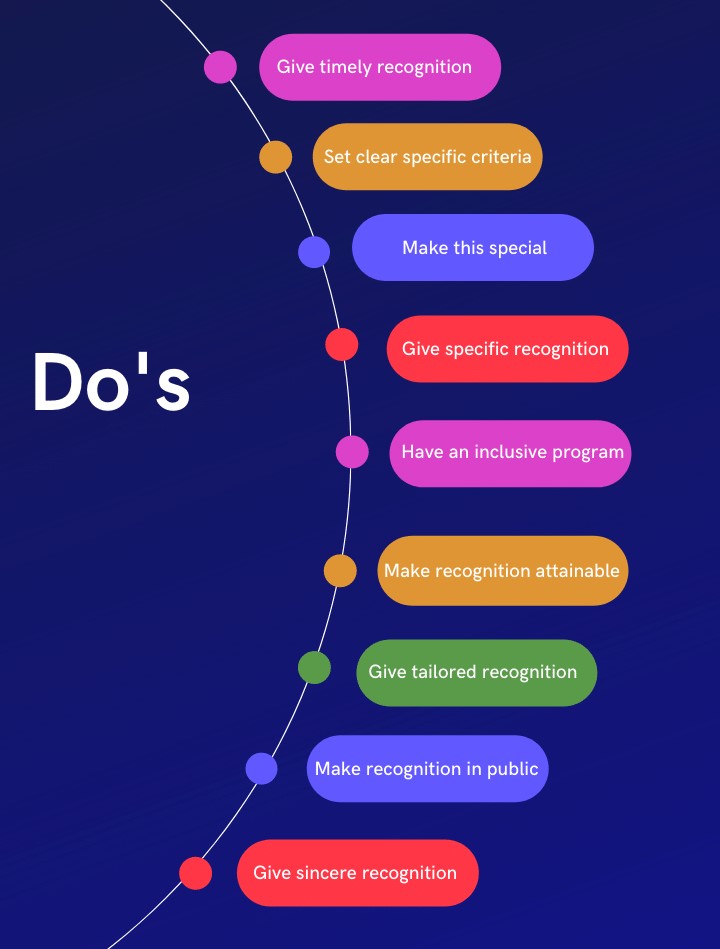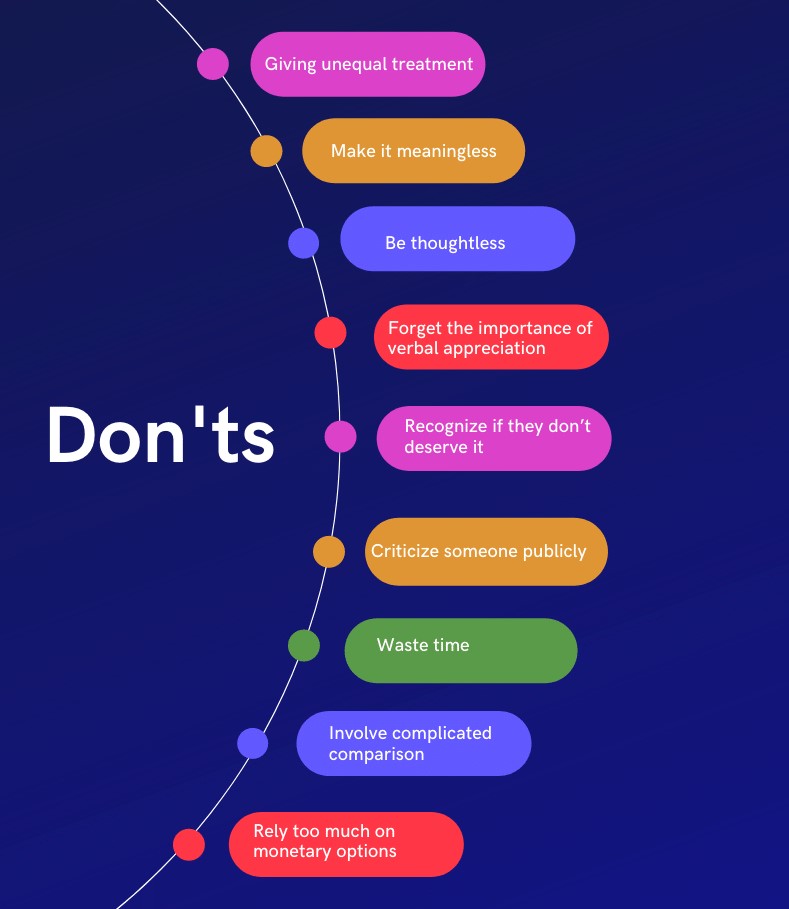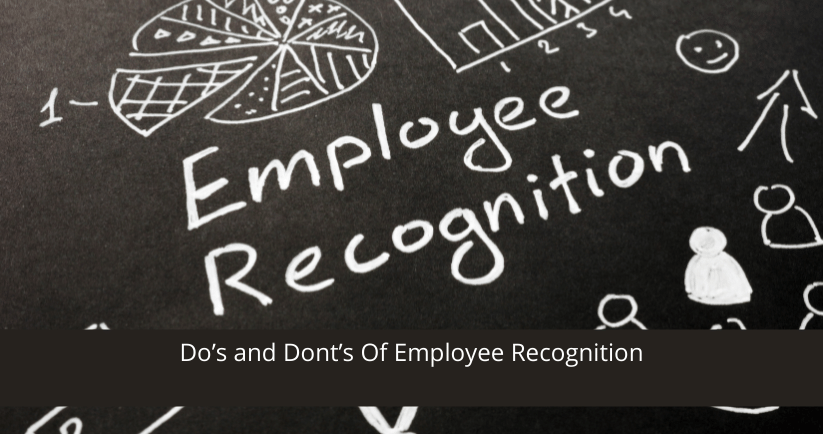Companies understand that employee recognition is very important for the success of any business. It boosts their morale and directs efforts towards organizational goals. This can increase productivity to a significant level. A good employee recognition program is crucial to make people feel that their efforts are valued. Not every initiative translates into a successful program and brings positive results. Pay close attention to different aspects to get excellent output.
Acknowledging the work and efforts of employees sounds simple but it is not always as easy to execute. Strategize a program to get the targeted result in a particular direction. Most companies think they cherish the efforts of their employee but the employee may not feel the same. Below are some do’s and don’ts for successful employee engagement activities.
Also Read: Employee Reward Systems: 5 Essential Factors for Deployment
Do’s of Employee Recognition

-
Make sure to give timely recognition
The employee must get appreciated as soon they achieve particular criteria. When a person receives immediate feedback it reinforces the desired behaviour. You can do this on a daily, weekly, monthly and annual basis for particular goals. This makes it easier to give much needed timely and frequent feedback.
-
Set clear specific criteria
Set specific criteria for employee recognition. Clearly define the expected activities and targets that would be encouraged. Also, make sure that you communicate the type of reward and awards they will receive on fulfilling criteria. Be specific and clear communication encourage more involvement in the initiative.
-
Make this special
When someone does something unique, it should be cherished in a special way. Make your efforts as appropriate and unique as the achievement is.
-
Give specific recognition
The idea is to reinforce particular culture. Tell your employees exactly what is desirable. Let them know what they are getting appreciated for. It reinforces the desired actions in the receiver. When you make it precise that makes others motivated to do the same. So it is about making sure to give the specifics so you get more positive participation from your employees.
-
Have an inclusive program across all the departments
There should be a single program across the firm. If the program is fragmented it benefits only some departments or teams, those who were not included stay unaffected. For large corporations with multiple departments make sure to design an inclusive program. The initiative to make particular behaviour a part of the work culture needs to include every person. Make simple criteria to involve everyone. It makes monitoring such a program easiest and also benefits all members.
-
Make recognition attainable
You must make the criterion for an employee the program achievable for all. Keep the structure of the company, different kinds of profiles and departments in mind. Make sure that everybody is eligible for the program. Design criteria that are attainable enough. That inspires everyone to give their honest efforts towards the achievement.
-
Give tailored recognition
Not every person is the same. The things that make people feel appreciated can be different. Understand what is more suitable for the person and the achievement. Make sure that the reward given will be cherished by the employee by making it suitable to their personality. There are employee recognition examples where winners are allowed to choose from specific options for the particular achievement. This can significantly increase participation.
-
Make recognition in public
Encourage positive initiatives. Praise the achievements of your employee in presence of other workers. This makes them feel admired motivates others and adopt a similar approach. When colleagues congratulate the achiever it serves as a bonus. People want both their superiors and co-workers to acknowledge their work.
-
Recognize individual as well as team efforts
Appreciate both individual and team efforts. Recognizing only individual efforts may demotivate people to contribute as a team. Similarly, when the only teams are rewarded, low performers also get benefits. Teamwork and leadership are equally important for a successful business. It builds a balanced and healthy culture.
-
Give sincere recognition
It is meaningful and works only when it is sincere. Do not make it generic. The employee should know that the firm knows their exact contribution. It should not feel like a formality. Try to personalise some aspects to make it seem more sincere.
Also Read: Why Employee Recognition And Rewards Are Needed Now More Than Ever?
The Don’ts of Employee Recognition
Employees like it when their work is admired at the workplace. It brings the awareness that they are important. It inspires them to work harder and show even more involvement. When done right, a program can bring a significant positive change. If done incorrectly it can backfire and cause real harm to the organization culture. Here are a few things to be avoided while designing a recognition program.

-
Avoid giving unequal treatment
Everyone who reaches the set criteria should be given an equal reward. When only a few are awarded for achieving criteria and others are not, they feel ignored. It sets a bad impression. This shows that you are not concerned about others. So make sure that prize is given to everyone who achieves the goal.
-
Don’t make it meaningless
The recognition aims to motivate them to be more involved and work harder. Make sure there are criteria for identifying the achievers. Do not make scheduled rounds appreciating a few employees in a rotation. This type of strategy does not really mean anything nor does it inspire someone to work harder. They will expect to be celebrated when it’s their turn. There is no need for more input as doing just enough is sufficient. This way it is easily taken for granted and defeats the purpose.
-
Avoid thoughtlessness
Put some thought while deciding on the reward. The receiver should feel appropriately awarded. This should not feel like just a formality. Make sure that it communicates that you value the efforts of your employee and care about their performance. Make it useful, appropriate and meaningful irrespective of the monetary cost.
-
Don’t forget the importance of verbal appreciation
Recognition does not always have to be some prize or award. If there is the desired behaviour, a simple compliment of “thank you” or “good job” will work. A compliment in the presence of a colleague from a superior for work well done also means a lot to the receiver.
-
Don’t recognize if they don’t deserve it
When everyone gets complemented irrespective of their performance or achievements defies the purpose. It is similar to giving a medal for doing just their basic job. These activities are meant to motivate extra involvement and better outputs. When employees are appreciated for just doing what is expected from them in a particular job role they do not need to work harder. It does not inspire them to improve.
-
Don’t criticize someone publicly
Criticism should always be reserved for the private. As much as praising someone in public works, criticizing in public is equally harmful and demotivating. Public criticism brings down morale irrespective of the motive. They may perform worse than before in future.
-
Don’t waste time
When you give recognition too late the employee may not feel the same level of motivation as compared to when given timely feedback. Having a huge time gap between achievements and receiving a prize for it may make them feel ignored. Build a system to make it frequent. So you can deliver your appreciation as soon as someone proves that they deserve it.
-
Don’t involve complicated comparison
Avoid complicated comparisons between different departments while setting criteria. Find a common ground for the comparison simple enough for everyone to understand. This avoids the possibility of any resentment or confusion. Having simple common criteria make sure that it does not seem easy for a specific department to achieve it as compared to others
-
Don’t rely too much on monetary options
For the recognition, it does not always have to be money as a reward. Public praise or an award can work similarly. The point is to encourage the work done by an employee. Some small meaningful gifts, extra time off or some investment in professional development can also work.
-
Don’t make it too much
Setting too many goals and criteria for recognition can get confusing. When there is too much to achieve and too little clarity, a few feel inspired to put in the effort. It is best to narrow down on a few aims. Define clear criteria and try to inspire efforts in that targeted direction.
-
Don’t set unrealistic objectives
When people find the criteria unrealistic it brings an opposite effect. The employee recognition program is supposed to motivate them. It should inspire everyone to perform better and contribute more. When the goal defined is too far away from the actual performance average, it can make an average worker feel that they are not considered. Employees feel they won’t get recognition irrespective of their efforts. Don’t set the aim to be too low either. It is important to find a middle ground that is achievable and brings a positive outcome.








